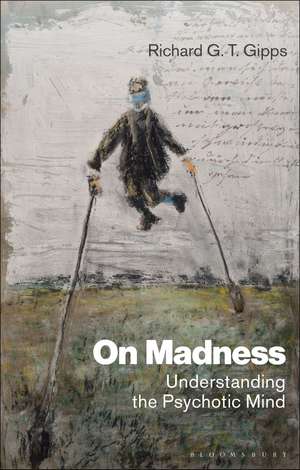On Madness: Understanding the Psychotic Mind
Autor Richard G. T. Gippsen Limba Engleză Paperback – 5 oct 2022
| Toate formatele și edițiile | Preț | Express |
|---|---|---|
| Paperback (1) | 160.87 lei 3-5 săpt. | +17.96 lei 7-13 zile |
| Bloomsbury Publishing – 5 oct 2022 | 160.87 lei 3-5 săpt. | +17.96 lei 7-13 zile |
| Hardback (1) | 468.75 lei 6-8 săpt. | +55.59 lei 7-13 zile |
| Bloomsbury Publishing – 5 oct 2022 | 468.75 lei 6-8 săpt. | +55.59 lei 7-13 zile |
Preț: 160.87 lei
Nou
Puncte Express: 241
Preț estimativ în valută:
30.78€ • 33.54$ • 25.94£
30.78€ • 33.54$ • 25.94£
Carte disponibilă
Livrare economică 02-16 aprilie
Livrare express 19-25 martie pentru 27.95 lei
Preluare comenzi: 021 569.72.76
Specificații
ISBN-13: 9781350192546
ISBN-10: 1350192546
Pagini: 272
Dimensiuni: 156 x 234 x 20 mm
Greutate: 0.41 kg
Editura: Bloomsbury Publishing
Colecția Bloomsbury Academic
Locul publicării:London, United Kingdom
ISBN-10: 1350192546
Pagini: 272
Dimensiuni: 156 x 234 x 20 mm
Greutate: 0.41 kg
Editura: Bloomsbury Publishing
Colecția Bloomsbury Academic
Locul publicării:London, United Kingdom
Caracteristici
Stays close to the patient's experience, drawing on significant autobiographical sources
Notă biografică
Richard G. T. Gipps is a Chartered Clinical Psychologist and Associate of the Faculty of Philosophy at the University of Oxford, UK. He is co-editor of The Oxford Handbook of Philosophy and Psychiatry (2013) and The Oxford Handbook of Philosophy and Psychoanalysis (2019).
Cuprins
Acknowledgements Introduction1. Mental Illness2. Delusion's Rational Irretrievability3. Reality Contact4. A World of One's Own5. The Divided Self6. Self and Other7. Hallucination8. Disordered Thought9. Psychotic Symbolization10. The Politics of Insanity Ascription NotesReferencesIndex
Recenzii
'What is it for a mind to become ill?' In On Madness, Richard Gipps takes us on a richly textured philosophical and psychological journey showing, in a Wittgensteinian spirit, how delusion, as other psychopathological concepts, have their meaning only 'in the stream of life'. A work of philosophical psychopathology which, in resisting the temptation of definition remains firmly grounded in understanding.
Gipps's is a deeply necessary work, because it is the first book of philosophy to take seriously that madness and delusion defy positive definition. For the ground required in order to predicate of the non-sane the kinds of things we can normally take for granted is missing. The desire to say of someone who is suffering the severest forms of strangeness that she thinks such-and-such is typically, Gipps wisely warns us, dangerously over-reaching, running the risk, if doggedly pursued, of being itself a madness of method. This brilliant book retrieves the disturbing, disturbed, difficult reality of psychoses from beneath the layers of motivated metaphysical scientism that have accreted over them. Moreover, Gipps shows how the very failures of the various forms of scientism themselves often take us as close as we can get to understanding the non-sane.
In this fascinating meditation, grounded in the thought of Wittgenstein, Richard Gipps argues that an adequate understanding of madness must first recognize the limits, perhaps even the impossibility, of any such understanding. Psychosis for Gipps is like the God of "negative theology": indescribable and unknowable, approachable only through negation. His subtle critique of psychiatric and psychological concepts nevertheless illuminates many mysteries that are typically obscured by standard forms of explanation and description.
Richard Gipps has produced a remarkable book that forces us to reconsider the rather easy definitions of madness that we are so easily drawn into, often quite unwittingly. Delusions are not just false beliefs in the house of reason, which might be corrected or easily translated, for reason itself is functioning here in a different way. Gipps has the advantage of being both a clinician and very talented philosopher with a deep understanding of Wittgenstein. This book will appeal both to psychiatrists and psychoanalysts who have an interest in philosophy and to philosophers who will see how examining madness brings fresh new ways of thinking into knowledge, reason and epistemology more generally.
Gipps's is a deeply necessary work, because it is the first book of philosophy to take seriously that madness and delusion defy positive definition. For the ground required in order to predicate of the non-sane the kinds of things we can normally take for granted is missing. The desire to say of someone who is suffering the severest forms of strangeness that she thinks such-and-such is typically, Gipps wisely warns us, dangerously over-reaching, running the risk, if doggedly pursued, of being itself a madness of method. This brilliant book retrieves the disturbing, disturbed, difficult reality of psychoses from beneath the layers of motivated metaphysical scientism that have accreted over them. Moreover, Gipps shows how the very failures of the various forms of scientism themselves often take us as close as we can get to understanding the non-sane.
In this fascinating meditation, grounded in the thought of Wittgenstein, Richard Gipps argues that an adequate understanding of madness must first recognize the limits, perhaps even the impossibility, of any such understanding. Psychosis for Gipps is like the God of "negative theology": indescribable and unknowable, approachable only through negation. His subtle critique of psychiatric and psychological concepts nevertheless illuminates many mysteries that are typically obscured by standard forms of explanation and description.
Richard Gipps has produced a remarkable book that forces us to reconsider the rather easy definitions of madness that we are so easily drawn into, often quite unwittingly. Delusions are not just false beliefs in the house of reason, which might be corrected or easily translated, for reason itself is functioning here in a different way. Gipps has the advantage of being both a clinician and very talented philosopher with a deep understanding of Wittgenstein. This book will appeal both to psychiatrists and psychoanalysts who have an interest in philosophy and to philosophers who will see how examining madness brings fresh new ways of thinking into knowledge, reason and epistemology more generally.
